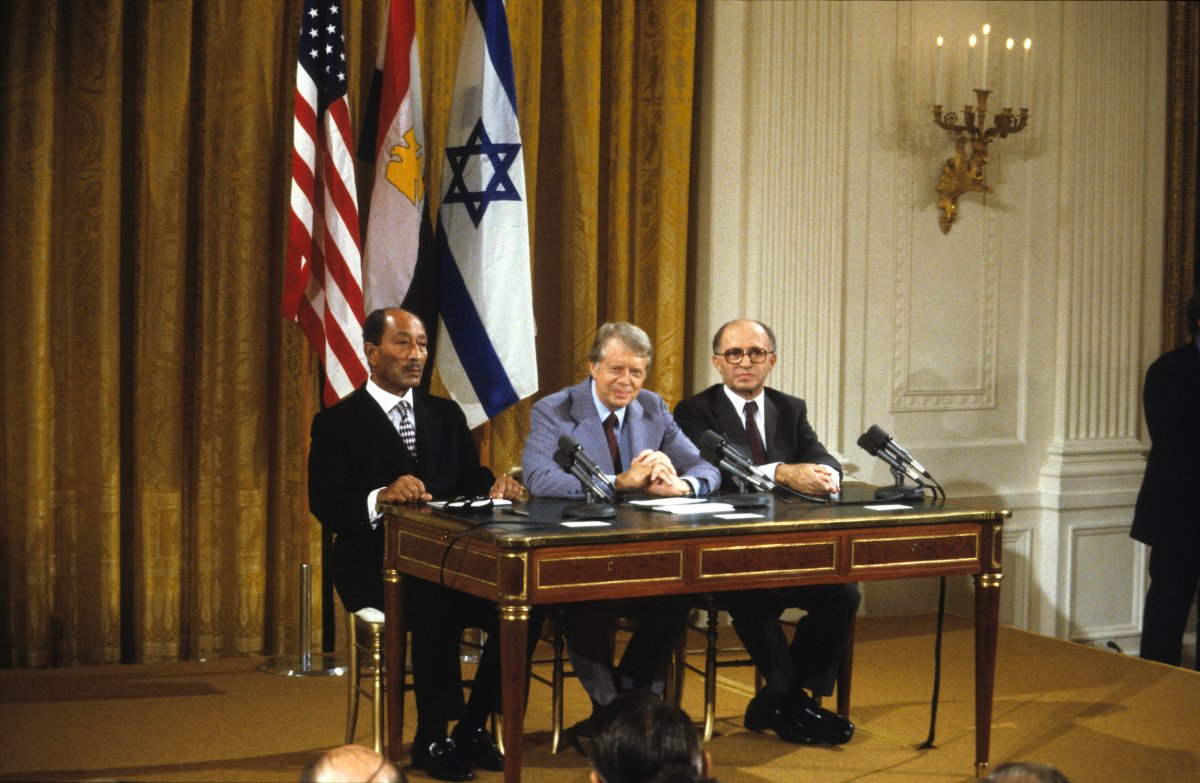On Sept. 17, 1978, at the climax of negotiations for an Israeli-Egyptian peace framework at the presidential retreat at Camp David, an exhausted President Jimmy Carter committed a blunder that would bedevil the Middle East for the next 44 years.
Carter thought he heard Israeli Prime Minister Menachem Begin agree to an indefinite freeze on the construction of new Israeli settlements in occupied Palestinian territory pending a peace treaty and final resolution of the Palestinian issue, a key requirement of Egyptian and American negotiators. Carter believed he had reached a verbal agreement with Begin on the issue, to be confirmed in writing by a public letter from Begin but "fudged" in the final text of the accords, which Carter had painstakingly cobbled together with Begin and Egyptian President Anwar Sadat over 13 grueling days.
But Carter neglected to get the supposed agreement committed to a piece of paper. The Egyptians were informed that the issue was resolved, and the three leaders raced to the White House for a triumphant signing ceremony that evening.

When Begins' letter arrived the next day, however, he committed only to something much less—a settlement freeze for three months until the completion of a peace treaty with Egypt, and he insisted that this was all he had agreed to. Jimmy Carter had been hoodwinked by Begin, a master negotiator who frustrated Carter so intensely during the Camp David talks that the American president privately called the Israeli leader a "psycho." Carter later admitted, "I misunderstood what Prime Minister Begin said," and noted, "that was a very serious defect, in not having that in writing."
Carter's last-minute bungle placed a poison pill in what many consider his greatest foreign policy achievement, and the Arab world's perception of the failure of the agreement to address Palestinian issues contributed to Saudi Arabia and other Arab nations avoiding the Camp David process in the years to come. The number of Israeli settlers in occupied and annexed territory rose from under 20,000 in 1978 to over 700,000 today. The settlement issue, explained Carter's National Security Advisor Zbigniew Brzezinski in 2003, "has paralyzed the possibility of genuine and rapid progress towards peace between the Israelis and the Palestinians."
Carter's fumbling of the Palestinian issue at Camp David echoed a parade of similar missteps, misdirections and wasted effort that erupted as soon as he entered the White House. Jimmy Carter wasn't just a micromanager, he was a molecular manager, inspecting tiny pieces of White House operations and poking his nose into minute details down to the subatomic particle level—while rarely grasping the "big picture". As soon as he assumed command of the White House, Carter submerged and saturated himself in detail, probing and burrowing for statistics, appendixes and back-up charts, more numbers, more data. He did not come up for air for four years, and he never learned to effectively prioritize, delegate, or organize his White House, and he failed to effectively communicate with or inspire the American people.
In his first weeks in the Oval Office, Carter ordered up reports on the operations of the White House motor pool and barber shop, and multiple analyses of newspaper and magazine subscriptions in the White House complex that he painstakingly marked up and revised by hand. Carter personally signed off on individual White House staff travel requests, and until his seventh month in office, he studied detailed monthly breakdowns of staff travel. Carter was making decisions down to the hundreds and tens of dollars, judgments that surely could have been delegated. "At times," noted national security advisor Brzezinski, "I thought he was like a sculptor who did not know when to throw away his chisel."
Carter was a deficit hawk who often fought with his fellow Democrats in Congress to hold down spending, and he absolutely hated to spend taxpayer money. In his first two years, Carter functioned as his own budget director, ordering over 28 different presidential reorganization studies and calling in experts two and three levels down in the budget hierarchy to scrutinize financial minutiae.
At the root of Carter's troubles was the paradox that he was the nation's chief political executive, but he hated politics. "Carter's anti-political attitudes used to drive me nuts, because you couldn't get him to grapple with a problem," noted Carter's vice president, Walter Mondale, who reported that "Carter thought politics was sinful."
Carter's own secretary of agriculture, Bob Berglund, described Carter's White House congressional relations team as "an unmitigated disaster." When Democratic House majority whip John Brademas was blindsided by Carter's staff in a foreign policy matter, he accused the White House of having "all the finesse of an alcoholic hippopotamus." One disillusioned Carter aide quipped that his White House was "like a movie set for a Marx Brothers picture, only except instead of four brothers, there were about a dozen."
In office, Carter was congenitally cheap, and he seemed to relish flaunting his parsimony. At early breakfast meetings with Congress, Carter authorized only dry rolls and coffee. The legislators protested and demanded eggs. At a summit meeting at Carter's pond house in Plains, Georgia, 20 of the top economists and bankers in America suffered for hours without food, snacks, or even water. The president of the Bank of America reportedly locked himself in a bathroom while trying to slurp water from a faucet.
By 1979, Carter registered the lowest Gallup job approval rating of any president in history, only 19 percent. The end of Carter's presidency was agonizing: the oil crisis ignited stratospheric inflation and interest rates, and the misery of the Iranian hostage crisis overwhelmed him. The hostage crisis vividly captured the bleak image of Carter's impotence as chief executive, as he cancelled his campaign activity and turned the Oval Office into a round-the-clock command bunker for running the hostage negotiations. In the 1980 presidential election, Ronald Reagan beat Carter in a landslide.
In his single term as president, Jimmy Carter squeaked through some successes. He negotiated the Panama Canal Treaties and the SALT II nuclear accord with the Soviet Union, which the Senate refused to ratify but was honored by both superpowers. He elevated human rights to the foreign policy agenda and extended diplomatic recognition to China. He pushed for the stealth bomber and other programs that helped lay the foundation for America's liberation of Kuwait 12 years later. He deregulated the energy, transportation, and communications industries.
Carter was the first president to push hard for Black, Latino and women's representation in federal employment and judicial appointments, and he doubled the size of America's national parks system with the Alaska Lands Bill. Carter's energy policies cut consumption, boosted production, and helped create an oil surplus by the mid-1980s, but much too late for him to enjoy the political benefit.
Carter spent his last two days in the Oval Office in feverish negotiations to get the American hostages safely out of Iran. At 8:06 a.m. on his last day as president, Carter was informed that the hostages' plane was cleared for takeoff at the airport in Teheran. But in a final act of torment, the Iranians were holding the jet and delaying the takeoff until after the inauguration of incoming President Ronald Reagan. The news crushed Carter. "He was as near despair as I have ever seen him," a top Carter assistant reported. "It was incredible agony."
Carter was so overwhelmed and upset that he had to be physically helped by his staff as he walked away from the Oval Office for the last time.
William Doyle is a New York Times bestselling, award-winning author and TV producer. His books include An American Insurrection: James Meredith and the Battle of Oxford, Mississippi, 1962 (Doubleday, 2002); Navy SEALs: Their Untold Story (co-authored with former U.S. Navy SEAL Dick Couch, HarperCollins, 2014); PT 109: An American Epic of War, Survival and the Destiny of John F. Kennedy (HarperCollins, 2015) Let the Children Play(co-authored with Pasi Sahlberg, Oxford University Press, 2019), Titan of the Senate: Orrin Hatch and the Once and Future Golden Age of Bipartisanship (2022), and many others.
The views expressed in this article are the writer's own.
Uncommon Knowledge
Newsweek is committed to challenging conventional wisdom and finding connections in the search for common ground.
Newsweek is committed to challenging conventional wisdom and finding connections in the search for common ground.
About the writer
To read how Newsweek uses AI as a newsroom tool, Click here.






